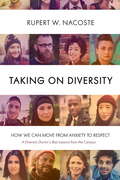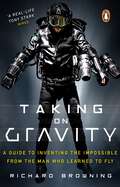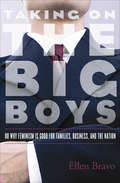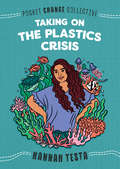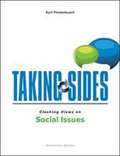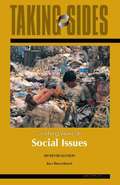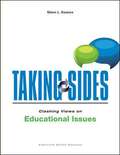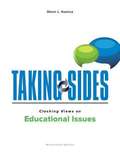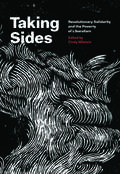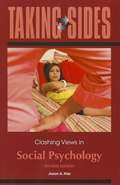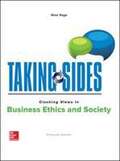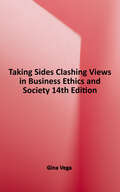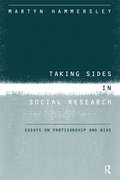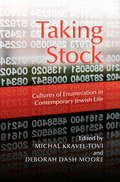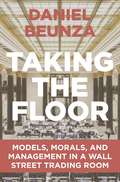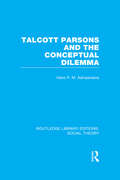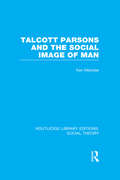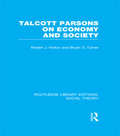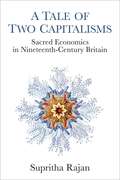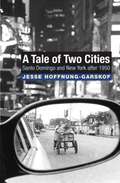- Table View
- List View
Taking on Diversity
by Rupert NacosteIn this enlightening book, a campus "diversity doctor" relates stories that individuals have shared with him about their anxieties in situations involving people who are in some way different than themselves. Dr. Rupert W. Nacoste regularly counsels students at North Carolina State University about their problems dealing with diversity of all kinds, including of gender, race, ethnicity, and sexual-orientation. Here, he shares his most effective techniques for handling the unavoidable realities of being in a neo-diverse community, whether that means in college or America as a nation. The author's proven "safe space" strategy can be applied to the campus, community groups, churches, and workplaces as a means to facilitate positive dialogue about diversity.In this time of current tensions, students, or "young travelers" as Nacoste fondly refers to them, still have much work ahead of them to achieve mutual respect and understanding. From everyday encounters, parties, and email and social media exchanges, they provide examples of ongoing bigotry: racial slurs and stereotypes are still used; young men continue to project demeaning attitudes toward women; and the heterosexual majority sometimes shows little understanding of the LBGT minority.Dr. Nacoste considers it his role to usher students off the "Wrong-Line train," and he has noticed that as they "leave the station," adults begin to follow their lead. The author demonstrates how we can maintain fairness and respect while still acknowledging our differences. By doing so, we can all learn to meet these challenges using sensitivity to different perspectives, open-minded attitudes, and the recognition that diversity in America is here to stay. From the Trade Paperback edition.
Taking on Gravity: A Guide to Inventing the Impossible from the Man Who Learned to Fly
by Richard Browning**As seen on Top Gear**'Richard Browning is a real-life Tony Stark.' - Wired---------------For fans of Adrian Newey, Guy Martin and Chris Hadfield, in Taking on Gravity inventor Richard Browning tells the inspiring story behind his iconic jet suit, and shares his creative principles for generating true innovation.From Icarus to Iron Man, the dream of human flight has always inspired and challenged us. Now, with his pioneering jet suit, Richard Browning has redefined what is possible.Richard Browning's story is one of groundbreaking innovation. Building an aviation business from his garage, he has invented a whole new form of personal flight - a fantasy previously reserved for the pages of science fiction. His iconic jet suit has captured the imaginations of millions around the world, triggered ongoing developments in technology and engineering, and inspired a new generation of creative minds to pursue their dreams.In Taking on Gravity, Browning reveals the creative principles of his multimillion-pound company, Gravity Industries, and shows us how grass-roots innovation can disrupt established industries in exciting and unexpected ways. On this journey into the sky we'll experience what it's like to take flight, to test the limits of the human body, and to convert moonshot ideas into tangible results.The Gravity story is an inspiring example of human creativity and our ceaseless desire to push the boundaries of what is possible. Where we go next is up to you.READERS LOVE THE 'TAKING ON GRAVITY' STORY***** 'Tony Stark Lite'***** 'Must read for anyone looking for inspiration to continue pursuing their dream'***** 'Taking on Gravity by Richard Browning is equal parts inspiring, inquisitive, soulful and ultimately a fantastic read that I will return to again.'
Taking On the Big Boys: Or Why Feminism Is Good for Families, Business, and the Nation (Mariam K. Chamberlain Series On Social And Economic Justice)
by Ellen BravoA manifesto for the workplace feminist that moved Oscar winner Jane Fonda to exclaim &“Please, please, please. All working women must read this book!&” Enough about &“breaking the glass ceiling.&” Here are blueprints for a redesign of the entire building, ground up, to benefit women and men—as well as the bottom line. In Taking on the Big Boys, longtime labor activist Ellen Bravo explores workplace environments in both business and government. She recounts women&’s testimonies from offices, assembly lines, hospitals, and schools, unmasking the patronizing, trivializing, and minimizing tactics employed by &“the big boys&” and their surrogates, such as portraying feminism as women against men, and dismissing demands for pay equity, family leave, and flex time as outrageous. Also included are practical tips on everything from dealing with a sexual harasser to getting family members to share chores—and build equal relationships. In this &“smart, kind, funny, and very effective&” Gold Medal Winner of ForeWord Magazine&’s Book of the Year Award for Women&’s Issues, Bravo argues for feminism as a system of beliefs, laws, and practices that value women and work associated with women, while detailing activist strategies to achieve a society where everybody—women and men—reach their potential (Gloria Steinem, feminist icon).
Taking on the Plastics Crisis (Pocket Change Collective)
by Hannah TestaPocket Change Collective was born out of a need for space. Space to think. Space to connect. Space to be yourself. And this is your invitation to join us."Taking on the Plastics Crisis delivers straightforward advise for getting involved in the global movement to eliminate single-use plastics." -- Booklist, Starred Review"Brief yet inspirational, this story will galvanize youth to use their voices for change."--Kirkus Reviews"Taking on the Plastics Crisis is a sobering and inspiring read by a brilliant young change maker. Now is the time for all of us to come together to solve the plastic pollution crisis."--Ed Begley Jr. (actor and environmental activist)In this personal, moving essay, youth activist Hannah Testa shares with readers how she led a grassroots political campaign to successfully pass state legislation limiting single-use plastics and how she influenced global businesses to adopt more sustainable practices. Through her personal journey, readers can learn how they, too, can follow in Hannah's footsteps and lower their carbon footprint by simply refusing single-use plastics.Pocket Change Collective is a series of small books with big ideas from today's leading activists and artists. In this installment, youth activist Hannah Testa, the founder of Hannah4Change, chronicles both her personal and political mission to save the Earth's oceans by limiting single-use plastic products.
Taking Sides: Clashing Views on Social Issues
by Kurt FinsterbuschThe Taking Sides Collection on McGraw-Hill Create#65533; includes current controversial issues in a debate-style forma designed to stimulate student interest and develop critical thinking skills. This Collection contains a multitude of current and classic issues to enhance and customize your course. You can browse the entire Taking Sides Collection on Create or you can search by topic, author, or keywords. Each Taking Sides issue is thoughtfully framed with Learning Outcomes, an Issue Summary, an Introduction, and an "Exploring the Issue" section featuring Critical Thinking and Reflection, Is There Common Ground?, Additional Resources, and Internet References. Go to the Taking Sides Collection on McGraw-Hill Create#65533; at www. mcgrawhillcreate. com/takingsides and click on "Explore this Collection" to browse the entire Collection. Select individual Taking Sides issues to enhance your course, or access and select the entire Finsterbusch: Taking Sides: Clashing Views on Social Issues, 19/e book here at http://create. mheducation. com/createonline/index. html#qlink=search%2Ftext%3Disbn:1259666409 for an easy, pre-built teaching resource. Visit http://create. mheducation. com for more information on other McGraw-Hill titles and special collections.
Taking Sides: Clashing Views on Social Issues, 15th Edition
by Kurt FinsterbuschTaking Sides: Clashing Views on Social Issues, Fifteenth Edition, is a debate-style reader designed to introduce students to controversies in sociology. The readings, which represent the arguments of leading social scientists and social commentators, reflect opposing positions and have been selected for their liveliness and substance and because of their value in a debate framework.
Taking Sides: Clashing Views an Educational Issues (Expanded Eighteenth Edition)
by Glenn KoonceThe Taking Sides Collection on McGraw-Hill Create(tm) includes current controversial issues in a debate-style format designed to stimulate student interest and develop critical thinking skills. This Collection contains a multitude of current and classic issues to enhance and customize your course. You can browse the entire Taking Sides Collection on Create, or you can search by topic, author, or keywords. Each Taking Sides issues is thoughtfully framed with Learning Outcomes, an Issue Summary, an Introduction, and an Exploring the Issue section featuring Critical Thinking and Reflection, Is There Common Ground?, and Additional Resources and Internet References. Go to McGraw-Hill Create(tm) at www. mcgrawhillcreate. com, click on the "Collections" tab, and select The Taking Sides Collection to browse the entire Collection. Select individual Taking Sides issues to enhance your course, or access and select the entire Koonce: Taking Sides: Clashing Views on Educational Issues, 18/e Expanded ExpressBook for an easy, pre-built teaching resource by clicking here. An online Instructor's Resource Guide with testing material is available for each Taking Sides volume. Using Taking Sides in the Classroom is also an excellent instructor resource. Visit the Create Central Online Learning Center at www. mhhe. com/createcentral for more details.
Taking Sides: Clashing Views on Educational Issues (19th Edition)
by Glenn L. KoonceThis book presents opposing or sharply varying viewpoints on educational issues of current concerns. Unit 1 offers consideration of three basic theoretical issues that have been discussed by scholars and practitioners in past decades and are still debated today: curriculum content and its imposition upon the young, the philosophical underpinning of the process of education, and the purpose of public education. Unit 2 features five issues that are fundamental to understanding the present circumstances that shape American education: democratic classrooms for citizenship preparation, student First Amendment rights, common curriculum considerations, policy and the Common Core standards, and the challenges of poor school performance. Unit 3 examines more specific issues currently being discussed: arming teachers, universal preschool, teacher preparation and the federal government, zero tolerance and the courts, no-zero grading, virtual schools, twenty-first century skills movement, flipped learning, class size and student achievement, school funding and student achievement, charter school expansion, and the impact of technology on teaching and learning.
Taking Sides
by Cindy Milstein"Taking Sides is more than a book; it's a politic aimed at the heart of every radical struggling against a racist state." --Luis A. Fernandez, author of Policing DissentTaking Sides is a critical response to divisive debates within current movements against police violence and white supremacy, especially since Michael Brown's murder. These sharp interventions ask activists to avoid easy--and safe--answers and take on the hard work of building real grassroots solidarity across racial lines.Cindy Milstein is author of Anarchism and Its Aspirations. Her essays appeared in Realizing the Impossible, Confronting Capitalism, and Globalize Liberation.
Taking Sides: Clashing Views in Social Psychology (Fourth Edition)
by Jason NierTaking Sides volumes present current controversial issues in a debate-style format designed to stimulate student interest and develop critical thinking skills. Each issue is thoughtfully framed with Learning Outcomes, an Issue Summary, an Introduction, and an Exploring the Issue section featuring Critical Thinking and Reflection, Is There Common Ground?, and Additional Resources. Taking Sides readers also offer a Topic Guide and an annotated listing of Internet References for further consideration of the issues. An online Instructor’s Resource Guide with testing material is available for each volume. Using Taking Sides in the Classroom is also an excellent instructor resource. Visit www. mhhe. com/takingsides for more details.
Taking Sides: Clashing Views In Business Ethics And Society
by Gina VegaThe Taking Sides Collection on McGraw-Hill Create® includes current controversial issues in a debate-style forma designed to stimulate student interest and develop critical thinking skills. This Collection contains a multitude of current and classic issues to enhance and customize your course. You can browse the entire Taking Sides Collection on Create or you can search by topic, author, or keywords. Each Taking Sides issue is thoughtfully framed with Learning Outcomes, an Issue Summary, an Introduction, and an "Exploring the Issue" section featuring Critical Thinking and Reflection, Is There Common Ground?, Additional Resources, and Internet References.
Taking Sides: Clashing Views in Business Ethics and Society
by Gina VegaThe Taking Sides Collection on McGraw-Hill Create™ includes current controversial issues in a debate-style format designed to stimulate student interest and develop critical thinking skills. This Collection contains a multitude of current and classic issues to enhance and customize your course. You can browse the entire Taking Sides Collection on Create or you can search by topic, author, or keywords. Each Taking Sides issue is thoughtfully framed with Learning Outcomes, an Issue Summary, an Introduction, and an "Exploring the Issue" section featuring Critical Thinking and Reflection, Is There Common Ground? Additional Resources, and Internet References.
Taking Sides in Social Research: Essays on Partisanship and Bias
by Martyn HammersleyIn the past it was generally taken for granted that the goal of social research was the production of objective knowledge; and that this required a commitment to value neutrality. In more recent times, however, both these ideals have come to be challenged, and it is often argued that all research is inevitably political in its assumptions and effects.In this major contribution to the debate, Martyn Hammersley assesses the arguments from the classic and still influential contributions of C. Wright Mills, Howard Becker and Alvin Gouldner to the present day. He concludes that the case for partisanship is not convincing, and that an intelligent and sceptical commitment to the principles of objectivity and value neutrality must remain an essential feature of research.
Taking Stock: Cultures of Enumeration in Contemporary Jewish Life
by Michal Kravel-Tovi Deborah Dash MooreTaking Stock is a collection of lively, original essays that explore the cultures of enumeration that permeate contemporary and modern Jewish life. Speaking to the profound cultural investment in quantified forms of knowledge and representation--whether discussing the Holocaust or counting the numbers of Israeli and American Jews--these essays reveal a social life of Jewish numbers. As they trace the uses of numerical frameworks, they portray how Jews define, negotiate, and enact matters of Jewish collectivity. The contributors offer productive perspectives into ubiquitous yet often overlooked aspects of the modern Jewish experience.
Taking Sustainable Cities Seriously: Economic Development, the Environment, and Quality of Life in American Cities
by Kent E. PortneyTaking Sustainable Cities Seriously: Economic Development, The Environment, And Quality Of Life In American Cities (American And Comparative Environmental Policy Series)
by Kent E. PortneyToday most major cities have undertaken some form of sustainability initiative. Yet there have been few systematic comparisons across cities, or theoretically grounded considerations of what works and what does not, and why. In Taking Sustainable Cities Seriously, Kent Portney addresses this gap, offering a comprehensive overview and analysis of sustainability programs and policies in American cities. <P><P>After discussing the conceptual underpinnings of sustainability, he examines the local aspects of sustainability; considers the measurement of sustainability and offers an index of "serious" sustainability for the fifty-five largest cities in the country; examines the relationship between sustainability and economic growth; and discusses issues of governance, equity, and implementation. He also offers extensive case studies, with separate chapters on large, medium-size, and small cities, and provides an empirically grounded analysis of why some large cities are more ambitious than others in their sustainability efforts. <P><P> This second edition has been updated throughout, with new material that draws on the latest research. It also offers numerous additional case studies, a new chapter on management and implementation issues, and a greatly expanded comparative analysis of big-city sustainability initiatives. <P><P> Portney shows how cities use the broad rubric of sustainability to achieve particular political ends, and he dispels the notion that only cities that are politically liberal are interested in sustainability. Taking Sustainable Cities Seriously draws a roadmap for effective sustainability initiatives.
Taking the Floor: Models, Morals, and Management in a Wall Street Trading Room
by Daniel BeunzaDebates about financial reform have led to the recognition that a healthy financial system doesn’t depend solely on how it is structured—organizational culture matters as well. Based on extensive research in a Wall Street derivatives-trading room, Taking the Floor considers how the culture of financial organizations might change in order for them to remain healthy, even in times of crises. In particular, Daniel Beunza explores how the extensive use of financial models and trading technologies over the recent decades has exerted a far-ranging and troubling influence on Wall Street. How have models reshaped financial markets? How have models altered moral behavior in organizations?Beunza takes readers behind the scenes in a bank unit that, within its firm, is widely perceived to be “a class act,” and he considers how this trading room unit might serve as a blueprint solution for the ills of Wall Street’s unsustainable culture. Beunza demonstrates that the integration of traders across desks reduces the danger of blind spots created by models. Warning against the risk of moral disengagement posed by the use of models, he also contends that such disengagement could be avoided by instituting moral norms and social relations.Providing a unique perspective on a complex subject, Taking the Floor profiles what an effective, responsible trading room can and should look like.
Taking the Measure of Work: A Guide to Validated Scales for Organizational Research and Diagnosis
by Dail L. FieldsThis book is a handbook for people who want to assure the use of reliable and valid questionnaires for collecting information about organizations. It significantly reduces the time and effort required for obtaining validated multi-question measures of aspects of organizational 'health' such as employee job satisfaction, organizational commitment, organizational justice, and workplace behaviors. It helps users in measuring some factors underlying employee perceptions of work such as job characteristics, role ambiguity or conflict, job stress, and the extent to which employees believe their values and those of the organization are congruent. All the measures in the book have been used and tested in research studies published in the 1990's. <p><p>In addition, all the measures describe the extent and types of reliability and validity tests that have been completed, a feature that organizational researchers should find particularly useful. All in all, this book is a handy tool to increase the efficiency of researchers, consultants, managers, or organizational development specialists in obtaining reliable and valid information about how employees view their jobs and organizations.
Talcott Parsons: Despair and Modernity (The\international Library Of Essays In Classical Sociology Ser.)
by Shaun BestThis is not a conventional biography but an attempt to explore the motives and intentions that underpin Talcott Parsons’ published work by exploring the reasoning Parsons shares with his readers in the pages of his many published works and the possible links between Parsons’ academic outputs and the social, economic and political situations in which Parsons found himself during the course of his life. Shaun Best brings together biography and the sociology of knowledge to demonstrate that there are links between the phases of Parsons theorizing the political, economic and social problems facing the United States; the circumstances in which he found himself and the intellectual decisions he made about what to publish. The assumption which underpins Parsons’ work is that knowledge is produced by people in particular historical conditions, grounded in sensory experience, exercising choice, judgment and reflection on those experiences. Thus, this book explores and evaluates Parsons’ ideas and arguments in relation to developments in social theory since the 1970s.
Talcott Parsons and the Conceptual Dilemma (Routledge Library Editions: Social Theory)
by Hans P.M. AdriaansensThis systematic analysis of the nature and development of Talcott Parson’s theory of action offers first an introduction to the conceptual paradigm upon which this theory is based – an introduction, that is, which will make Parson’s writing more easily accessible. Second, the book gives an explanation of the development which the action theory has undergone during the half-century of Parson’s career. Using a scheme of four theory-levels, the author indicates the crucial premises that can be distilled from Parson’s early works. He argues that Parsons, from the very start of his career, was trying to translate abstract premises into a systematically constructed conceptual scheme. The first conceptual translation, however, turned out to be vague and inconsistent in many respects, and this study offers a very specific explanation of the inadequacy of this first (structural-functional) version of the theory of action. Dr Adriaansens argues that it was not until Parsons had found his way out of this ‘conceptual dilemma’ that the premises of the action theory could be adequately translated into a conceptual paradigm.
Talcott Parsons and the Social Image of Man (Routledge Library Editions: Social Theory)
by Ken MenziesThis account of Talcott Parsons’s work clarifies his basic concepts and sets out their correlation. Dr Menzies believes that the philosophy of science working within the confines of the analytic-synthetic distinction tends to provide a rigid, static and sterile account of theories. He presents a more dynamic account of the scientific enterprise in order to come to grips with the amorphous nature of theory, and to provide the basic framework for his analysis of Parsons. Menzies argues that Parsons’s central problematic in The Structure of Social Action is utilitarianism in general and the classical economists’ account of the rise of capitalism in particular, and as such the book is not a reconciliation of positivistic and idealistic elements and these run throughout his subsequent work. Two major strands in Parsons’s work – the social action theory and the systems theory (structural-functionalism) – are separated and examined individually.
Talcott Parsons on Economy and Society (Routledge Library Editions: Social Theory)
by Bryan S. Turner Robert J. Holton'In this remarkable collection of essays, Holton and Turner demonstrate that Parsonian sociology addresses the most central problems of our time – issues of sickness and health, power and inequality, the nature of capitalism and its possible alternatives. They develop a mature and original perspective on Parsons as the only classical theorist who avoided crippling nostalgia. Holton and Turner not only talk about Parsonian sociology in a profound and insightful way, they do it, and do it well. As sociology moves away from the rigid dichotomies of earlier debate, this book will help point the way.' – Jeffrey Alexander, Professor and Director of Graduate Studies in Sociology, UCLA
A Tale Of Two Capitalisms: Sacred Economics In Nineteenth-century Britain
by Supritha RajanNo questions are more pressing today than the ethical dimensions of global capitalism in relation to an unevenly secularized modernity. A Tale of Two Capitalisms offers a timely response to these questions by reexamining the intellectual history of capitalist economics during the nineteenth century. Rajan's ambitious book traces the neglected relationships between nineteenth-century political economy, anthropology, and literature in order to demonstrate how these discourses buttress a dominant narrative of self-interested capitalism that obscures a submerged narrative within political economy. This submerged narrative discloses political economy's role in burgeoning theories of religion, as well as its underlying ethos of reciprocity, communality, and just distribution. Drawing on an impressive range of literary, anthropological, and economic writings from the eighteenth through the twenty-first century, Rajan offers an inventive, interdisciplinary account of why this second narrative of capitalism has so long escaped our notice. The book presents an unprecedented genealogy of key anthropological and economic concepts, demonstrating how notions of sacrifice, the sacred, ritual, totemism, and magic remained conceptually intertwined with capitalist theories of value and exchange in both sociological and literary discourses. Rajan supplies an original framework for discussing the ethical ideals that continue to inform contemporary global capitalism and its fraught relationship to the secular. Its revisionary argument brings new insight into the history of capitalist thought and modernity that will engage scholars across a variety of disciplines.
A Tale Of Two Cities: Global Change, Local Feeling and Everday Life in the North of England (International Library of Sociology)
by Karen Evans Penny Fraser Ian TaylorA Tale of Two Cities is a study of two major cities, Manchester and Sheffield. Drawing on the work of major theorists, the authors explore the everyday life, making contributions to our understanding of the defining activities of life.
A Tale of Two Cities: Santo Domingo and New York After 1950
by Jesse Hoffnung-GarskofIn the second half of the twentieth century Dominicans became New York City's largest, and poorest, new immigrant group. They toiled in garment factories and small groceries, and as taxi drivers, janitors, hospital workers, and nannies. By 1990, one of every ten Dominicans lived in New York. A Tale of Two Cities tells the fascinating story of this emblematic migration from Latin America to the United States. Jesse Hoffnung-Garskof chronicles not only how New York itself was forever transformed by Dominican settlement but also how Dominicans' lives in New York profoundly affected life in the Dominican Republic.<P> A Tale of Two Cities is unique in offering a simultaneous, richly detailed social and cultural history of two cities bound intimately by migration. It explores how the history of burgeoning shantytowns in Santo Domingo--the capital of a rural country that had endured a century of intense U.S. intervention and was in the throes of a fitful modernization--evolved in an uneven dialogue with the culture and politics of New York's Dominican ethnic enclaves, and vice versa. In doing so it offers a new window on the lopsided history of U.S.-Latin American relations. What emerges is a unique fusion of Caribbean, Latin American, and U.S. history that very much reflects the complex global world we live in today.
